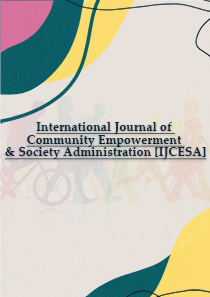International Journal of Community Empowerment & Society Administration [IJCESA]
Citation :
Noviyati Rahardjo Putri, Sulistyani Prabu Aji, Syarifah Syarifah, 2025. "Empowering the Elderly in Hypertension Management: Blood Pressure Monitoring and Medication Adherence " International Journal of Community Empowerment & Society Administration [IJCESA] Volume 2, Issue 1: 1-5.
Abstract :
Hypertension is a major non-communicable disease affecting the elderly and often goes undetected, leading to serious complications. This community engagement program aimed to empower older adults in managing hypertension through routine blood pressure checks and participatory health education focused on medication adherence. The activity was conducted with 40 older adults from the Bilansia community in Surakarta, who regularly gather for social and health-related events. A community-based participatory approach was applied, involving three main phases: preparation, implementation, and evaluation. Blood pressure measurements were conducted using calibrated devices, followed by interactive education sessions that included group discussions, practical demonstrations, and experience sharing among participants. Results showed that 80% of participants remained within the hypertensive range despite ongoing antihypertensive medication, indicating challenges in treatment adherence and lifestyle modification. Although no quantitative knowledge assessment was performed, participant engagement during discussions and reflections suggested increased awareness and motivation. The use of familiar, emotionally supportive community settings proved effective in promoting behavioral change. This initiative highlights the value of collaborative health promotion strategies within elderly communities, emphasizing the importance of sustained, culturally relevant, and socially engaging interventions to improve medication adherence and blood pressure control. Such models should be integrated into regular community programming to support national hypertension control efforts.
References :
[1] Adeloye, D., Basquill, C., Aderemi, A. V., Thompson, J. Y., & Obi, F. A. (2015). An estimate of the prevalence of hypertension in Nigeria. Journal of Hypertension, 33(2), 230–242. https://doi.org/10.1097/HJH.0000000000000413
[2] Amanak, K., Sevil, Ü., & Karacam, Z. (2019). The impact of prenatal education based on the roy adaptation model on gestational hypertension, adaptation to pregnancy and pregnancy outcomes. Journal of the Pakistan Medical Association, 69(1), 11–17.
[3] Bosu, W. K. (2022). Accelerating the Control and Prevention of Non-communicable Diseases in Ghana: the Key Issues. Postgraduate Medical Journal of Ghana, 2(1), 32–40. https://doi.org/10.60014/pmjg.v2i1.25
[4] Chen, Y., Li, X., Jing, G., Pan, B., Ge, L., Bing, Z., Yang, K., & Han, X. (2020). Health education interventions for older adults with hypertension: A systematic review and meta‐analysis. Public Health Nursing, 37(3), 461–469. https://doi.org/10.1111/phn.12698
[5] Chobanian, A. V. (2003). The Seventh Report of the Joint National Committee on Prevention, Detection, Evaluation, and Treatment of High Blood Pressure. JAMA, 289(19), 2560. https://doi.org/10.1001/jama.289.19.2560
[6] Dinas Kesehatan Provinsi Jawa Tengah. (2023). Profil Kesehatan Jawa Tengah (1st ed.). Dinas Kesehatan Provinsi Jawa Tengah.
[7] Guo, A., Jin, H., Mao, J., Zhu, W., Zhou, Y., Ge, X., & Yu, D. (2023). Impact of health literacy and social support on medication adherence in patients with hypertension: a cross-sectional community-based study. BMC Cardiovascular Disorders, 23(1), 93. https://doi.org/10.1186/s12872-023-03117-x
[8] Kearney, P. M., Whelton, M., Reynolds, K., Muntner, P., Whelton, P. K., & He, J. (2005). Global burden of hypertension: analysis of worldwide data. The Lancet, 365(9455), 217–223. https://doi.org/10.1016/S0140-6736(05)17741-1
[9] Kemenkes RI. (2023). Riset Kesehatan Dasar (Riskesdas). Kementerian Kesehatan.
[10] Mills, K. T., Stefanescu, A., & He, J. (2020). The global epidemiology of hypertension. Nature Reviews Nephrology, 16(4), 223–237. https://doi.org/10.1038/s41581-019-0244-2
[11] Oktaviana, E., & Rispawati, B. H. (2023). Pengaruh Edukasi terhadap Pengetahuan Pasien Hypertension. Jurnal Penelitian Perawat Profesional, 5(1), 263–268.
[12] Shahin, W., Kennedy, G. A., & Stupans, I. (2021). The association between social support and medication adherence in patients with hypertension: A systematic review. Pharmacy Practice, 19(2), 2300. https://doi.org/10.18549/PharmPract.2021.2.2300
[13] Walidah, Z. (2017). Pengaruh pemberian edukasi terhadap pengetahuan dan sikap pasien Hypertension di Puskesmas Sutojayan Kabupaten Blitar. Universitas Islam Negeri Maulana Malik Ibrahim.
[14] World Health Organization. (2021). Hypertension. Fact Sheets Hypertension. https://www.who.int/news-room/fact-sheets/detail/hypertension
Keywords :
Community-Based Health Promotion, Elderly, Health Education, Hypertension, Medication Adherence.


